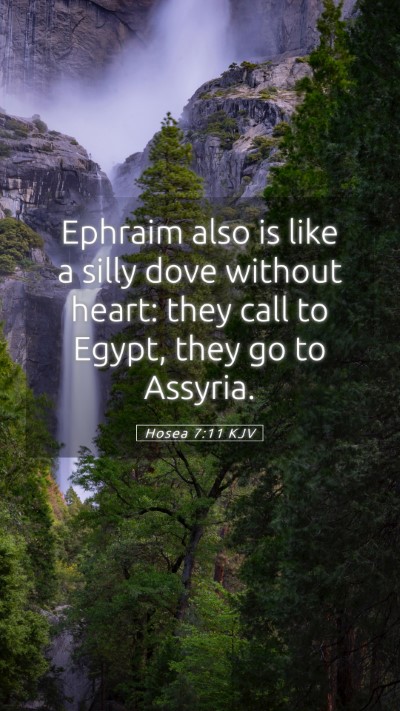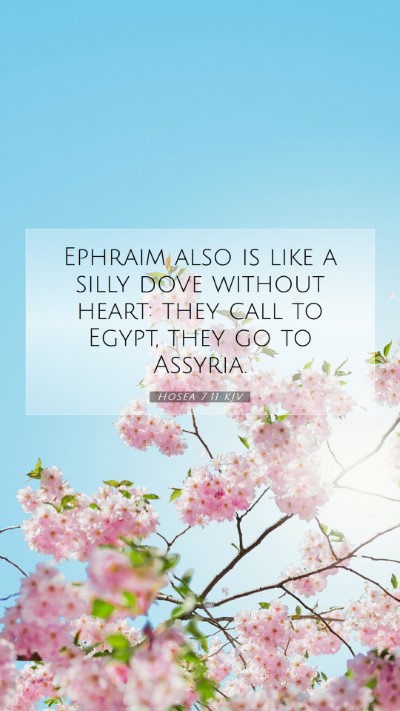Old Testament
Genesis Exodus Leviticus Numbers Deuteronomy Joshua Judges Ruth 1 Samuel 2 Samuel 1 Kings 2 Kings 1 Chronicles 2 Chronicles Ezra Nehemiah Esther Job Psalms Proverbs Ecclesiastes Song of Solomon Isaiah Jeremiah Lamentations Ezekiel Daniel Hosea Joel Amos Obadiah Jonah Micah Nahum Habakkuk Zephaniah Haggai Zechariah MalachiHosea 7:11 Meaning
What is the meaning of Hosea 7:11?
Ephraim also is like a silly dove without heart: they call to Egypt, they go to Assyria.
Hosea 7:11 Bible Verse Meaning
Bible Verse Explanation: Hosea 7:11
In Hosea 7:11, the verse states: "Ephraim is like a silly dove without sense: they call to Egypt, they go to Assyria." This passage presents a vivid metaphor that captures the spiritual folly of the people of Ephraim. Below, we delve into the meaning of this verse through combined insights from several public domain commentaries.
Verse Breakdown and Context
To understand this verse accurately, we must examine the historical context and the intended message:
- Historical Setting: Hosea prophesied in a time when Israel was in moral decline and political instability. Ephraim, often referring to the northern kingdom of Israel, was in a state of rebellion against God.
- Metaphorical Interpretation: The comparison of Ephraim to a "silly dove" conveys a sense of vulnerability and impulsiveness. Doves are often seen as gentle creatures but can also be easily misled.
Insights from Commentators
The insights from notable commentators provide a deeper understanding of this verse:
- Matthew Henry: He highlights the folly of Ephraim, which, seeking human alliances with Egypt and Assyria instead of relying on God, depicts a lack of understanding and discernment. This pursuit led them further into sin and instability.
- Albert Barnes: Barnes underscores that the actions of the Israelites reflect their desperation and misguided trust in foreign powers for assistance. They turned to nations known for their strength, but in doing so, they neglected their spiritual obligations and reliance on God.
- Adam Clarke: Clarke elaborates on the "silly dove" analogy, emphasizing that the dove is seen as a creature lacking wisdom, which symbolizes the Israelites’ imprudent actions. Their flight towards Egypt and Assyria represents a search for safety in alliances that could only lead to greater danger.
Meaning of the Verse
This verse captures several significant concepts:
- Spiritual Blindness: Ephraim's inability to discern the right path signifies broader spiritual blindness among God’s people, who often look to worldly solutions for problems that require divine intervention.
- Futility of Trusting in Man: The passage teaches that placing trust in human alliances rather than God leads to consequences that hinder spiritual growth and reliance on divine wisdom.
- Call to Repentance: The metaphor serves as a warning, urging the people to return to God, who alone can provide true safety and guidance.
Application to Daily Life
Understanding this verse can invoke deep reflection and application in our lives:
- Recognizing Present-Day Alliances: Just as Ephraim sought help in the wrong places, believers today are called to evaluate their own sources of security and support. Are they looking to God, or relying on worldly systems?
- Cultivating Discernment: This verse encourages individuals to cultivate discernment to avoid spiritual folly and to make choices based on faith rather than fear or desperation.
- Encouraging Reliance on God: The passage serves as a reminder to seek God's help first, thus inviting us to deepen our relationship with Him through prayer and dependence.
Related Bible Cross References
For further study, here are several related verses that resonate with the themes found in Hosea 7:11:
- Psalm 118:8-9: "It is better to trust in the Lord than to put confidence in man." This verse reinforces the lesson on the futility of human reliance.
- Isaiah 31:1: "Woe to those who go down to Egypt for help." This passage echoes Hosea’s message about seeking help from ungodly nations.
- Proverbs 3:5-6: "Trust in the Lord with all your heart and lean not on your own understanding." Here, we find encouragement to trust in God's plan and wisdom.
Conclusion
Hosea 7:11 serves as a profound reminder of the dangers inherent in misplaced trust and spiritual weakness. By understanding this scripture, believers are better equipped for Bible study and personal spiritual growth. Whether in individual reflection or as part of Bible study groups, the insights gleaned from this verse invite deeper understanding and application of Scripture in our daily lives.


